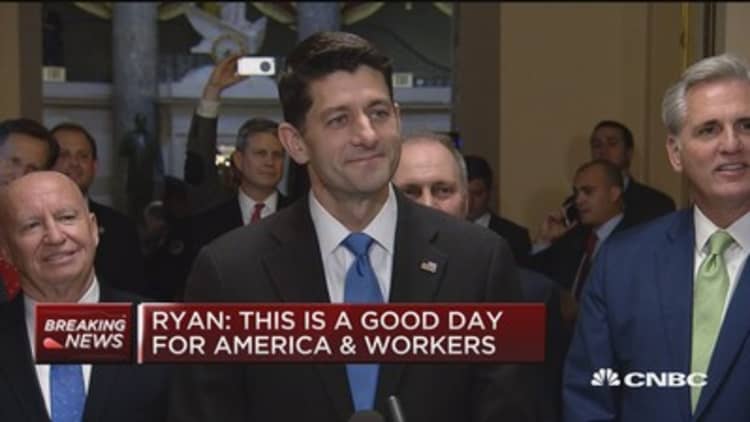On the face of it, the loss of "miscellaneous itemized deductions" for many taxpayers might not sound all that significant.
But the elimination of them in the $1.5 trillion tax cut signed into law by President Donald Trump in December will leave a hole in many workers pockets, experts say.
Nurses can't write off their scrubs any more. Salespeople can't deduct their travel expenses. Professors can't subtract research costs.
Those are just a few examples on a long list of expenses that, under the old tax code, employees could potentially write off — provided that those were expenses for which their employer didn't reimburse them, and that added up to more than 2 percent of their gross income.
The really big story of the tax bill is that it favors capital over labor.Seth Harrisa deputy labor secretary under President Barack Obama
Republicans have argued that fewer deductions are needed now that the standard deduction has nearly doubled to $12,000 for single filers and $24,000 for married couples.
Yet Seth Harris, a deputy labor secretary under President Barack Obama, said a lot of the employees who itemize have many different expenses — including mortgages — that would still make itemizing worthwhile. Plus, he added, deductions for corporations still abound.
"The really big story of the tax bill is that it favors capital over labor," said Harris. "It's heavily skewed to benefit people who get money without working, as opposed to those who labor for a living."
Other eliminated "miscellaneous itemized deductions" include work-related legal fees, home office costs, medical examinations required by an employer, union dues and licenses.
"While people can say there's a doubling of the standard deduction, those who have significant unreimbursed business expenses will not do as well," said David Kamin, a former economic policy advisor in the Obama administration and a law professor at New York University.

Martin Davidoff, a certified public accountant and tax attorney based in Dayton, New Jersey, said many of his professional clients won't be able to write off big expenses.
Davidoff gave an example: A salesman makes $200,000 a year, but in order to generate those commissions, he travels to visit clients and takes them out to dinner. He can't deduct those expenses now.
It's unfair that companies' so-called cost of doing business is still deductible, Davidoff said.
"Take a look at McDonald's," he said. "They spend $50 million on a Superbowl ad, and they get to deduct it."
Paul Drizner, a tax attorney who has written about the new code's impact on employees, said that many teachers will have to chose between spending less on their classroom or taking home less money. (Educators will still receive a $250 above-the-line deduction on unreimbursed workplace expenses whether or not they itemize).
"Teachers shouldn't be paying out of their own pocket to put their lessons together," Drizner said.
Howard Nilson, a certified public accountant in Maryland also known as the Online Biz Tax Guy, said he's been looking for ways to help his clients who will feel the loss of these deductions, like a construction worker who used to write off expensive tools every year.
"I work with middle-class American families, and that's one area that will have a big impact on them," Nilson said.
Navigating unreimbursed expenses
Nilson recommends employees talk to their bosses about ways to potentially recoup these losses.
Changing the structure of how you handle expenses may help. For example, many employee expenses are doled out in a "flat allowance," in which employees receive a set amount at regular intervals to allocate to work purposes. They usually don't need to provide their employer with a breakdown of how they spent the money.
Under the new tax code, these allowances can now be a burden.
While people can say there's a doubling of the standard deduction, those who have significant unreimbursed business expenses will not do as well.David Kaminlaw professor at New York University
"The allowance is taxable income to the employee, but they could previously deduct any work-related expenses they spent the allowance on," Nilson said.
But some employers may be willing to move to a so-called accountable plan, in which the employee needs to submit evidence — like receipts or mileage logs — for any expenses they incur and get reimbursed for. Under this plan, employees don't need to include their work-related expenses as income, and therefore don't need to fret the lost deductions.
It's also worth checking to see if you qualify to be an independent contractor, which could allow you to deduct a variety of business-related expenses on Schedule C of your tax forms.
And when it comes to expenses that aren't reimbursed, Nilson recommends employees be frank with their bosses about the tax code's favoritism toward businesses. They should ask for certain costs to be covered or even a pay increase.
"Make the case you're going to be negatively financially impacted and they're going to be positively financially impacted," Nilson said. "And work out a way to get compensated for that in some way."
More from Personal Finance:
This tax bill provision helps families save on school costs and taxes
These changes under the GOP tax plan affect homeowners
The strong economy could be your ticket to a new job


